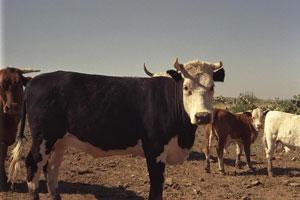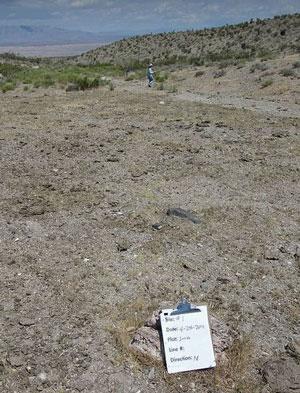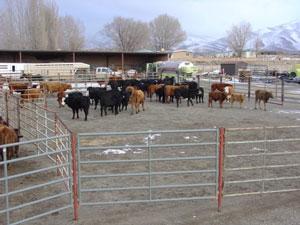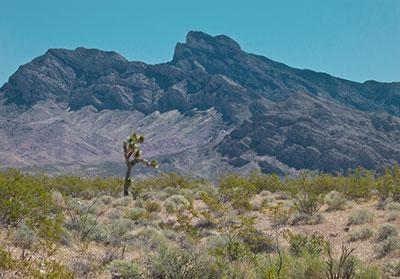In a situation that reads like a bad plot from an old western movie, officials with the Bureau of Land Management and Lake Mead National Recreation Area are hoping for a peaceful resolution of a cattle trespass dispute with a Nevada rancher that has lasted more than 20 years. It's a tense and tricky situation.
What's going on the desert northeast of Las Vegas?
The answer goes all the way back to the 1800s, when parts of the West were settled by ranchers who controlled vast areas of open range simply by securing relatively small tracts that included scarce and essential water sources'and then grazing their livestock on the adjoining land.
As more settlers looking for their own land arrived, open range was often overgrazed, disputes arose, and the resulting conflicts provided fodder for many a western novel and movie. Order was eventually secured by a combination of land surveys to define property lines, systems such as the Homestead Act to allow orderly transfer of public land to private ownership, and institutions such as courts and law enforcement to keep the peace.
Grazing Leases and the Bureau of Land Management
Public land which was not legally converted into private ownership remained in the public domain, and some ranchers continue to use public property to supplement their private range. Much of that public land is being managed today by the U. S. Bureau of Land Management (BLM), and that agency faces a challenging and often controversial task: "to manage and conserve the public lands for the use and enjoyment of present and future generations under our mandate of multiple-use and sustained yield."

The BLM manages grazing permits on public land all across the West. BLM photo.
One of those "multiple uses" is grazing, and a dispute between a rancher named Cliven Bundy and the BLM over the use of land in southern Nevada has lasted for more than 20 years. The former grazing lease, known as the Bunkerville allotment, includes public land managed by both the BLM and National Park Service at Lake Mead National Recreation Area, with the BLM handling grazing issues for the NPS.
"Multiple Use" Can Lead to Conflicts
A mandate to manage large areas of land for such diverse uses as grazing, wildlife, recreation, mining, timber and energy development often leads to conflicts, and that's the case on the Bunkerville allotment.
Beginning in 1993, the BLM informed Mr. Bundy about limits on the number of cattle he could graze on the allotment in order to meet regulations to protect wildlife, particularly a threatened species, the desert tortoise. Mr. Bundy refused to accept the limits and stopped paying the required fees for his grazing permit ... but continued to run his cattle on the property.
The BLM subsequently cancelled the grazing permit, and in 1997, Clarke County, Nevada, purchased all the active grazing permits in the area to conserve them for wildlife needs. A tentative proposal was made to Mr. Bundy to compensate him for any stock water rights or range improvements he might have in his former allotment. He rejected the offer...and continued to run his cattle.
Failed Negotiations Lead To Court Cases
After further attempts to negotiate with Mr. Bundy failed, a series of court cases that extended up to the Ninth Circuit Court of Appeals upheld an injunction which permanently enjoined Mr. Bundy from grazing cattle on the Bunkerville allotment, and ordered him to remove all trespass cattle. He refused, despite notices that the livestock would be subject to impoundment and removal if they remained.
While the legal wrangling continued, the number of cattle in the area continued to grow. In 1999, the BLM was able to document 51 head of Bundy cattle on federal range in the allotment; by 2011, over 900 cattle were counted by a helicopter survey of the rugged terrain.
Mr. Bundy apparently concedes that he has never owned any of the land in question, but disputes the BLM's jurisdiction; he contends he has the right to continue to use the property, since his family has been doing so since the 1880s.

Damage to soil and vegetation from concentrated use by trespass cattle in the former Bunkerville Allotment. BLM photo.
The BLM Still Manages Lots of Grazing Permits
The BLM has taken pains to point out that it is not anti-grazing, noting that it "administers approximately 18,000 grazing permits and leases on 157 million acres of public lands..."Ranching continues throughout Southern Nevada on public and private lands," the agency notes. "BLM currently has three active grazing allotments on more than 100,000 acres of public lands in Southern Nevada."
Kirsten Cannon, spokeswoman for the Nevada BLM office in Reno, says, 'His cattle have been illegally trespassing on federal land for two decades and it's just unfair for those who ranch in compliance,' she said. 'We made repeated attempts to resolve this. The courts have ordered him to move his cattle. Now we've reached the last resort, which is impoundment.'
You can read a summary of the history of the dispute at this BLM link, and the agency, under increasing pressure from other local landowners and conservation groups, has decided it's time to remove the cattle and resolve the issue.
There's no doubt that Mr. Bundy has flouted the legal system for years, but you might wonder what else is at stake in this situation.
A Long List of Problems Caused by Trespass Livestock
The BLM cites a long list of problems caused by Mr. Bundy's cattle. Among the issues are damage by the cattle to springs and vegetation on public land and trampling of artifacts at cultural sites. Crops on adjacent private property have been damaged by foraging livestock, and residents of the communities of Bunkerville and Mesquite have complained about the impact of trespass cattle on city facilities, including the Mesquite Heritage Community Garden and the Mesquite golf course.
If you've even been around cattle which aren't accustomed to being "worked" regularly by humans, you'll understand the safety concerns for visitors and employees using the BLM and park lands in question. According to the BLM, "a State of Nevada employee at the Overton Wildlife Refuge has been attacked by a Bundy bull, and a feral cow was hit by an automobile within Lake Mead National Recreation Area. Cattle are frequently seen on public roads, including State Route 170, and pose a danger to vehicles and to members of the public traveling on public roads."
There have been other economic costs from the trespass livestock. The Nevada State Department of Wildlife has had to build extensive fences to protect state and federal lands in the Overton Wildlife Refuge from the cattle. The Walton Family Foundation had offered $400,000 for a matching grant to restore wildlife habitat in the area, but has withdrawn the funds until the trespass cattle have been removed. It's a reasonable decision; restoration efforts would be a waste of money as long as the cattle continue to roam and damage the area.
Two Decades of Waiting May Be Coming to an End
So, what's next?

These trespass cattle, removed off public land in northern Nevada, are being cared for until they are claimed and fines/impoundment fees are paid. BLM photo.
According to a statement from Lake Mead National Recreation Area, "The BLM and NPS have made repeated attempts to resolve this matter administratively and judicially. Impoundment of cattle illegally grazing on public lands is an option of last resort. The BLM and NPS are working closely with local, state and federal officials to ensure the gather of unauthorized cattle occurs in a safe and orderly manner."
During what will undoubtedly be a challenging roundup, the area involved will be closed to public use from March 27 through May 12. The park website notes, "Only a small portion of the northern and eastern part of the park will be temporarily closed, and Echo Bay, Stewarts Point, Redstone and the hot springs along Northshore Road remain open." You can view a map of the area within the park involved in the closure at this link.
Bundy's Response
So, what's Mr. Bundy's reaction to the latest developments? That's a cause for concern, and at least part of the reason for the closure of the area to the public during the impending roundup.
A previous roundup scheduled for 2012 was cancelled due to fears of a violent confrontation with Bundy, and the BLM opted for one more try at a solution in the courts. That cancellation in turn brought threats of a lawsuit against the BLM from an environmental group, for failure to enforce court orders to remove the livestock. In 2013, the BLM prevailed once again in court.
Bundy's response to the numerous court orders to remove his cattle has been succinct. "At first I said, 'No,'" he told The Los Angeles Times last year, "Then I said, 'Hell, no.'"
"I've got to protect my property," Bundy told the Times. "If people come to monkey with what's mine, I'll call the county sheriff. If that don't work, I'll gather my friends and kids and we'll try to stop it. I abide by all state laws. But I abide by almost zero federal laws."
The County Sheriff Urges A Peaceful Solution
It doesn't appear the county sheriff plans to intervene on the Bundys' behalf. According to Carol Bundy, the rancher's wife, 'We want him to step in and tell these federal characters that 'This is Clark County, Nevada, land and you have go through me to get these cattle.' But we have not heard a word.'
For his part, Clark County Sheriff Doug Gillespie understands the days of the 19th century range wars are long past. The Las Vegas Review-Journal quoted Gillespie as saying: 'I'm always concerned when there are situations like this where there is so much emotion. I hope calmer heads will prevail like they normally do. You're talking about rounding up cattle. You have to keep that in perspective. No drop of human blood is worth spilling over any cow, in my opinion.'
He absolutely right. Let's hope everyone else involved in this situation agrees.




Comments
What's worse, a politician or an elitist?
Most multiple choice quizzes require four possible choices.
That becomes very clear in such exchanges as: "They did however, agree unanimously that the power of the national government be limited . . "
And: "Nope, never said that."
Lee - please go back and reread. "Nope, never said that" refers to his claim I said the was unanimous agreement about enumerated powers".
I never said that. I did say there was unanimous agreement that the national government should be limited. Which is why, despite his long dissertation, ethel can't provide any evidence to show that isn't true.
For Ethel, Necessary and Proper cause gave the Congress the power to make laws necessary and proper to executing the enumerated powers. Not to let them do anything they wanted. If they could do anything they wanted why have enumerated powers (the point Madison made in Fed 41).
The reason there are things the government can't do is to ensure that those things aren't done pursuant to executing the enumerated powers. For example, the power was granted to "define and punish piracies" but the ex post facto prohibition prevented Congress from punishing those for piracy acts defined after the acts were committed.
ecbuck: "They did however, agree unanimously that the power of the national government be limited and as Madison wrote, both in the Constitution and the Federalist papers, the powers were limited to those enumerated."
me: "You also say that the Founders agreed unanimously that the powers of the federal government were limited to those enumerated in the Constitution."
ecbuck: "'Nope, never said that' refers to his claim I said the was unanimous agreement about enumerated powers". I never said that. I did say there was unanimous agreement that the national government should be limited."
I'm calling bs on this one. Had you simply said "They did, however, agree unanimously that the power of the government should be limited," I wouldn't have argued that point at all. Of course they all agreed that the power of the federal government should be limited. None of them were so extreme that they were advocating for a federal government that was literally limitless in its power.
But you threw that AND clause on at the end there. "And as Madison wrote, both in the Constitution and the Federalist papers, the powers were limited to those enumerated."
Now you're saying "I never said they were unanimous about enumerated powers." But you clearly did. You can try to evade that, but that's what you said, in plain English.
I wouldn't argue with "They did however, agree unanimously that the power of the national government be limited."
I wouldn't argue with "They did however, agree unanimously that the power of the national government be limited and some also thought that, as Madison wrote, both in the Constitution and the Federalist papers, the powers were limited to those enumerated."
But that's not what you said. So if you misspoke, fine, I'll accept that and that's fine. And I agree that absolutely, there are and should be limits on government power (in Hamilton's argument in favor of implied powers, he still didn't claim that the government was literally limitless in power). But some of the founders did very much believe that the Constitution allowed for implied powers beyond those enumerated, and the legal tradition in this country going back 200 years backs that up.
Used to be that way but now with Common Core...:).
BTW, Rick B, do all bureaucrats lie also or assumed to like the Lois Lerners and so many in this administration that are being protected by the AG (Held in Contempt)with the apparent blessing of the WH? As long as they're doing what you want? I believe that you don't go that far but that's what's going on.
I hope you all saw Bundy's comments as quoted this morning in the New York Times:
"I want to tell you one more thing I know about the Negro," he said. Mr. Bundy recalled driving past a public-housing project in North Las Vegas, "and in front of that government house the door was usually open and the older people and the kids -- and there is always at least a half a dozen people sitting on the porch -- they didn't have nothing to do. They didn't have nothing for their kids to do. They didn't have nothing for their young girls to do.
"And because they were basically on government subsidy, so now what do they do?" he asked. "They abort their young children, they put their young men in jail, because they never learned how to pick cotton. And I've often wondered, are they better off as slaves, picking cotton and having a family life and doing things, or are they better off under government subsidy? They didn't get no more freedom. They got less freedom."
He's not only a deadbeat, but also a racist. Even politicians like Rand Paul are distancing themselves from his remarks.
Rick
He's a piece of work, alright. His words have now become tools which might potentially be used, by association, against those who come to the defense of our freedom from government tyranny and the defense of our First Amendment Rights. Bundy's socially isolated, ignorant and with an ego so large that he actually thought people had shown up in Nevada to support "him". LOL He does have the right to speak his mind, just like you and me. I regret that he failed to consider and understand the consequences of his words.
The problem here isn't Bundy, it's the BLM/NPS/DOI/WH dangerous and decitful actions. Yes, I see the squirrel over there, but the uproar is not Bundy's failure to pay fees or the stupid things he says.
Those supporting this administration are a continually shrinking minority, many have realized the grave mistake they made. I didn't vote for him, but I was proud that he did get elected showing that racism is truely a problem of the past.